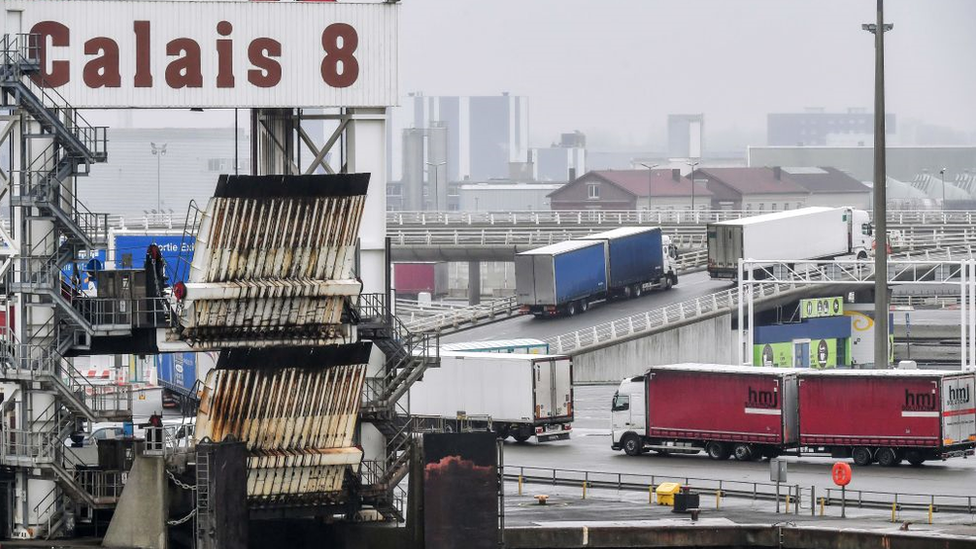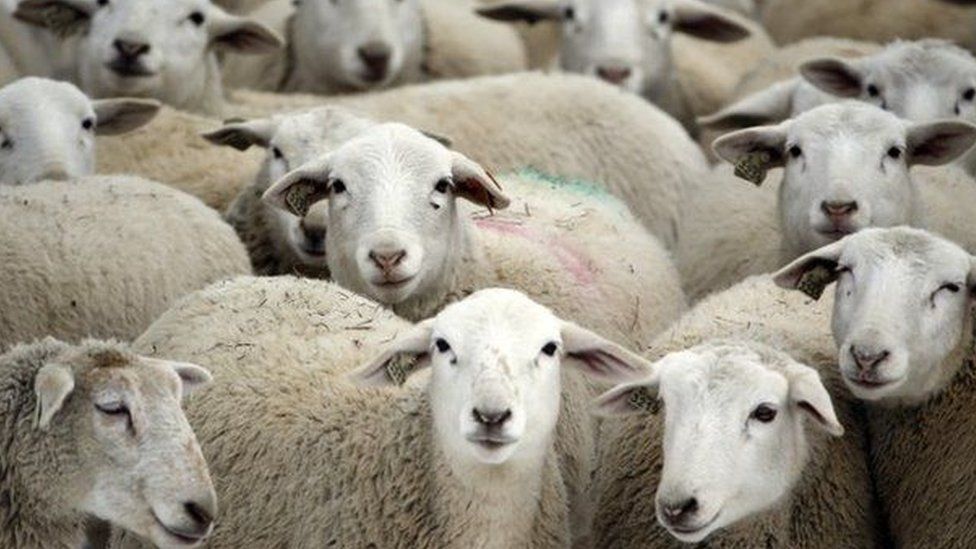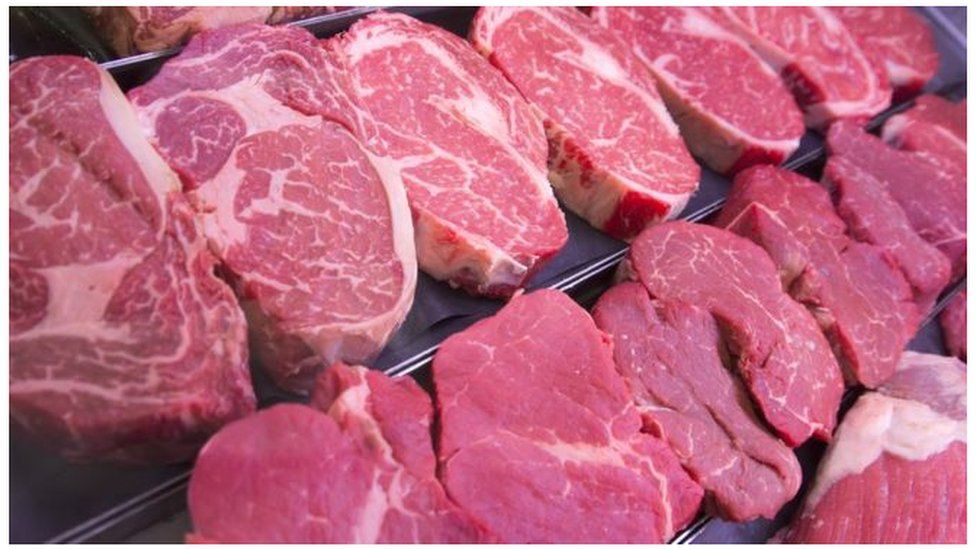
- Brexit talks have been passed back to negotiators, with little sign of progress from the UK and EU leadership, and with no deal getting worryingly close for exporters.
- Sheep meat is one sector facing particularly high tariffs - put there to protect British and other European farmers, but now the UK will be outside the EU fortress.
- Even with a tariff-free deal, there will be high extra costs for animal produce going to Europe, involving certification, queues and border checks.
Remember spring? If you were lucky enough to get out to somewhere rural, you probably saw some cute lambs a-gambolling.
Well, it's not looking good for them now. They've put on some weight, and are less cute. Or they were. This has been the slaughtering season.
About a third of Scottish lamb goes for export, and 98% of that is to the European Union. French chefs highly value uplands-grazed lamb.
There's a metaphor somewhere in there for the Brexit talks.
But for sheep farmers, this isn't metaphor. This is their future. The average tariff on sheep meat is 48%. It is not a flat rate: instead, there's a fee per kilo and a percentage of the value.
And the more it is butchered and processed, the higher the tariff on entering the European Union.
Why so high? Because the European Union has acted as a fortress to protect its farmers, including those in Britain, against cheap imports. New Zealand, for instance, produces more efficiently in bigger farm units, with bigger flocks and blessed with better quality pasture.
'Fortress Europe'
New Zealand, which took a huge hit when the UK joined the European Economic Community, is still a big exporter into the European Union (and the UK), but only up to a tariff-free quota.
So while the UK consumes roughly the same amount of sheep meat that it produces, there is a more complex food market of surplus and exports at this time of year, and imports at other times.
Having been protected by the fortress Europe regime for agriculture, the UK has chosen to go outside said battlements. And at such levels of tariff, a no-deal Brexit at the end of this month is expected to lead to no exports at all.
What happens then? Britain will have an oversupply, which would drive down prices, making sheep farming non-viable.
One option is to develop new markets. That doesn't happen overnight. The next best market is likely to be in the Middle East and North Africa. Halal slaughter would be required, and there are animal welfare issues with that.

A UK government minister suggested sheep farmers could shift to beef, to replace Ireland's sales of beef into the UK. (He didn't offer suggestions on what Ireland's beef farmers should do.)
Beef will also face very high tariffs, as the UK government intends to continue keeping out cheap imports, and if it has to set a high tariff to keep out beef from the US, Brazil or Argentina, the World Trade Organisation rules dictate that it has to set the same tariff for Ireland and the rest of the European Union.
Unless, that is, there's a deal on reducing tariffs.
The farming experts I've been hearing from over recent weeks of looking into this also point out that shifting from sheep to beef is a lengthy process of buying and rearing stock, and some land simply isn't suitable for it.
Pig farmers have another distinctive issue. In Britain, we eat less than half a pig. The other bits have other uses. You probably don't want to know the details, but think "sausage meat". It is only by making maximum use of all the "fifth quarter" cuts of meat that pig farming can be viable.
'No questions asked'
A lot of this is exported, in what is known as groupage - lots of bits of pig in the back of a truck. In the single market, that can be trucked straight through to Germany's sausage factories, no questions asked. Outside the single market, each consignment within that groupage requires export certification.
So this is one part of the economy, and an important one for rural Scotland, watching closer than most as the two sides in Brexit talks struggle and so far fail to reach a deal.
As I've already detailed, those producing seed potatoes won't be allowed to export anything at all, even with tariffs, unless there's a new trading relationship.
Tariffs as a percentage are much lower on car parts, but such is the efficiency and inter-dependence of the auto industry supply chain that a failure to get a deal is estimated by manufacturers to carry a £55bn cost to that industry.
Fisheries remain a stumbling block, as the UK government seeks to keep its promises to a small number of coastal communities.

They made no such promises to the larger number of people who process and export fish, and those whose shellfish exports depend on quick, easy access to European markets. So they are the ones who would lose out if British exporters face tariffs or quotas.
And if there is a deal, bringing an end to the threat of tariffs? Returning to the sheep farmers, that would be a huge relief. But being outside the single market and customs union will still carry a significant cost.
Every export consignment of animal products, including meat and dairy, will have to carry an Export Health Certificate, signed by a vet who has to be qualified in the complex task of tracing supply chains.
(As things stand, a supermarket lorry loaded in Scotland and carrying numerous types of meat and dairy to a Northern Ireland retail outlet will need an export certificate for each one of them, because the province is deemed to be inside the single market.)
With carcasses loaded onto trucks, they head for the Channel ports. Each truck will need a pass to be allowed into Kent, where they could face long delays in lorry parks, at least until the new rules settle down.
Crossing to Calais, they will find it has no entry port (yet) for red meat, so it will have to be taken for checking up the coast at Dunkirk. Fish have to be taken down the coast to Boulogne, and if fresh, they lose value at a faster rate.
Limited licences
Arrival at customs will have to be pre-booked. Each truck's paperwork will have to be checked for tractor unit and trailer, and there will be a check that the consignment matches the lorry. There are a limited number of licences by British drivers allowed onto the continent.
Customs officers can check as rigorously as they wish. At present, inbound consignments from New Zealand face a low level of checking. From Brazil, the proportion checked is much higher.
It's not impossible that a rancorous UK departure from the EU will lead to lengthy checks and even longer queues. Suppose French fishing crews are in dispute over access to British waters, and you can see that Boulogne might not be a welcoming destination for a lorry-load of British fish.
And so it goes on. The practicalities of Brexit with a deal are much more onerous than at present.
The costs of Brexit without a deal are much higher still, and in agricultural goods, they will simply kill off large export markets. The stakes for steaks could hardly be higher.
https://news.google.com/__i/rss/rd/articles/CBMiLWh0dHBzOi8vd3d3LmJiYy5jb20vbmV3cy91ay1zY290bGFuZC01NTIwOTMyOdIBMWh0dHBzOi8vd3d3LmJiYy5jb20vbmV3cy9hbXAvdWstc2NvdGxhbmQtNTUyMDkzMjk?oc=5
2020-12-06 16:33:00Z
52781222921133
Tidak ada komentar:
Posting Komentar